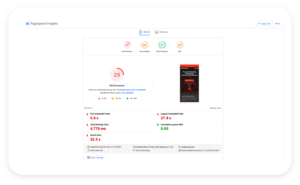In the competitive world of cybersecurity, standing out in search engine results is crucial. However, achieving high rankings requires a unique approach tailored to the industry’s nuances. In this blog post, we’ll explore SEO strategies specifically designed for cybersecurity brands.
1. Secure and Mobile-Friendly Websites
Search engines prioritize secure and mobile-friendly websites. Ensure that your site is HTTPS secured, providing a safe browsing experience. Mobile responsiveness is also a crucial factor, considering the increasing use of smartphones for online activities.
When designing new websites for our clients, we subscribe to a mobile-first mentality, ensuring any new website design works seamlessly on mobile devices. Take our work with Securonix for example. Securonix delivers a next-generation security analytics and operation platform for the modern era of big data and cyber threats. They came to Bluetext to evolve their brand and website with a completely new look. One of the major components of the rebuild of the Securonix website was to ensure every part of the website looked and worked seamlessly on various mobile devices across multiple browsers. Bluetext did extensive regression and cross-browser testing to ensure all pages and functionality were rendered and functioned as intended.

2. Targeted Keyword Optimization
Identify and optimize for relevant keywords specific to cybersecurity. Tailor your content to address common queries and concerns in the cybersecurity landscape. Long-tail keywords that reflect user intent can be particularly effective in attracting the right audience.
A key deliverable in any Bluetext website design and development engagement is the creation of an SEO roadmap, identifying keywords to be implemented across the website including headlines, blog posts, and navigation menus.
3. Quality Content with Expertise
Create high-quality, authoritative content that showcases your expertise in cybersecurity. This can include in-depth articles, whitepapers, and case studies. Valuable content not only attracts organic traffic but also positions your brand as a trusted source of information.
When developing a new website for our clients, we always recommend developing a robust blog program to establish brand credibility and increase SEO on-page ranking. If clients don’t have the resources in-house to create blog content, we’re happy to do so on their behalf as part of our engagement, ensuring the utilization of the correct SEO keywords and topics.
4. Technical SEO Best Practices
Implement technical SEO best practices, such as optimizing meta tags, improving website speed, and enhancing site navigation. Search engines reward websites that provide a smooth and user-friendly experience.
One tool you can utilize is Google’s PageSpeed Insights. You can analyze your existing website and determine ways to improve your technical SEO score, boosting your on-page search results.

5. Backlinks from Trustworthy Sources
Build a strong backlink profile by obtaining links from authoritative and trustworthy sources within the cybersecurity domain. Collaborate with industry influencers, participate in cybersecurity forums, and contribute to reputable publications to earn quality backlinks.
6. Regular Security Audits
Perform regular security audits not only for the safety of your users but also for SEO. Search engines may penalize insecure websites. By maintaining a secure online environment, you not only protect your users but also ensure your site’s visibility in search results.
7. Local SEO for Targeted Reach
If your cybersecurity brand operates in specific regions, leverage local SEO strategies. Optimize your Google My Business profile, include location-specific keywords, and participate in local cybersecurity events to enhance your presence in local search results.
By combining these SEO strategies tailored for cybersecurity, you can not only improve your search engine rankings but also establish your brand as a go-to resource for users seeking reliable and secure solutions in the digital realm. Need support in developing your SEO strategy? Contact Bluetext for help.



